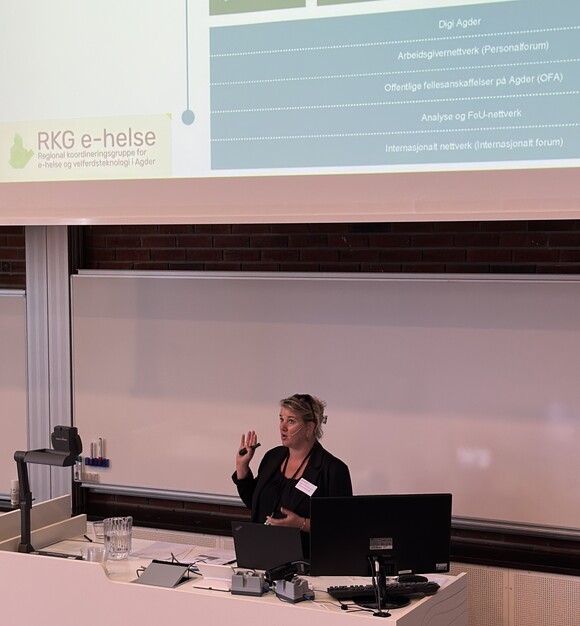
Anders W. Andersen, Dean of the Faculty of Health and Sports Sciences, guided everyone through the day. He also serves as the chair of the centre's Professional council for research and innovation in e-health
Invited to explore e-health research
On 13 September, the Centre for e-health invited people to an Open Research Day, shedding light not only on the centre's research activities but also providing valuable insights into perspectives on trends and visions within e-health.
"The day provides a comprehensive view of the Centre for e-health's research activities at both regional and national levels. It's also wonderful to have international participants present," stated Lene Rathe, Senior Advisor at the Directorate of E-Health. She was one of the keynote speakers invited by the centre to share insights into perspectives on trends and visions within e-health. Donna Henderson, leader of the Scottish Government’s Digital Health and Care Directorate’s International Engagement Team, had a similar mission, but from an international perspective.
User participation in focus
The day's program was structured in alignment with the centre's strategic plan, which clearly identifies four main focus areas:
1. User participation in development and co-creation
2. Digital healthcare services
3. New technologies for health, coping, and learning
4. Better use of health data
A common thread across all these areas is a strong user-centric approach, which the Centre for e-health holds as a core value. Ragni MacQueen Leifson, the centre's administrative leader, expresses this commitment emphatically: "Whenever there is a need for user engagement in a project, the Centre for e-health should be the very first that comes to mind."
Lene Rathe also underscores the following: "The research expertise of the Centre for e-health related to user involvement and testing is further highlighted by the challenges posed by the Health Personnel Commission: 'So far, the potential for realizing gains has been largely untapped. This may be because digital solutions have not sufficiently been aligned with the actual needs of users...' NOU 2023: 4 – Time for Action (external website in Norwegian)."
Agder region excels
The Regional Coordination Group for E-Health and Welfare Technology in Agder (RKG e-health), represented by Kathrine M. Holmerud, presented an overview of e-health from a regional perspective and their extensive collaboration across sectors.
The Agder region was highlighted as a clear leader in welfare technology and is one of the five model regions in the entire Nordic region in this field. Their dedication and innovation were confirmed when they won the EPSA (European Public Sector Award) for 'Best Practices' in 2019. Agder has also been awarded a four-star status as a reference region in the European Reference Site network for active and healthy aging (external webpage).
The i4Helse building was also presented as an excellent example of the region's commitment to promoting e-health and welfare technology. Participants at the event were given a tour of the impressive facilities, including a housing simulator, XR lab, a showroom for Welfare Technology, and a user testing lab.
"These facilities provide a unique opportunity for interdisciplinary learning and problem-solving, preparing future professionals for work in digital care environments," stated Dr. Sanna Rimpiläinen, who had traveled all the way from Scotland to attend the research day. She is the Head of the Research & Skills Department at the Scottish Innovation Centre for Digital Health & Care, which has a close collaboration with the centre.
A technological future
In an era marked by constant innovation, the healthcare industry is taking a significant leap into the future with a range of groundbreaking technologies. Extended Reality (XR), humanoid robots, and Artificial Intelligence (AI) have now taken a central place in the healthcare sector, heralding a revolutionary development.
Dr. Sanna Rimpiläinen points to the explosive growth of the global XR market. From $12 billion in 2020, the market is now expected to increase by an astounding 506%, reaching $72.8 billion by 2024. This development indicates a revolution in the way we approach health and medical treatment.
In the United Kingdom and Germany, significant changes are also seen in the job market. By 2030, it is expected that a whopping 400,000 jobs will benefit from VR/AR technology, a staggering increase of 2567% from just around 15,000 in 2019. This underscores the significant growth potential these technologies have in transforming the workforce and streamlining healthcare services.
Professor Helinä Melkas from LUT University in Finland and a visiting professor at the centre discusses the use of robots in healthcare. She emphasizes the positive shift in attitudes currently taking place. However, she notes that there is still a lack of user involvement in product development, and the healthcare sector is not adequately prepared for the technological revolution. She underscores the importance of starting with identifying user needs and tasks where robots can provide valuable assistance.
The technological future of healthcare is ever-changing, and it is now up to the industry, researchers, and healthcare professionals to collaborate and ensure that these innovations become a valuable resource for patients and healthcare providers worldwide.
A successful event
The Open Research Day was a success, where participants gained valuable insights into the research conducted by the Centre for e-health, as well as intriguing perspectives on e-health trends, both nationally and internationally. To wrap up the day, an informal gathering with delicious tapas was organized, providing excellent opportunities for discussions and networking. "It's important to have a meeting place with our partners and to showcase some of what we're working on. I look forward to the opportunity to repeat this event next year,", concludes Elin Thygesen, the academic leader of the Centre for e-health.
Do you want to attend future events like this, or get updated on what the Centre for e-health is doing?



